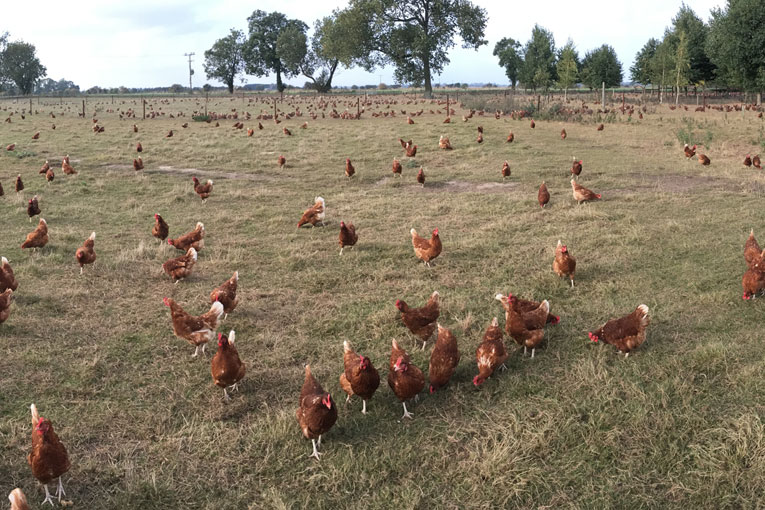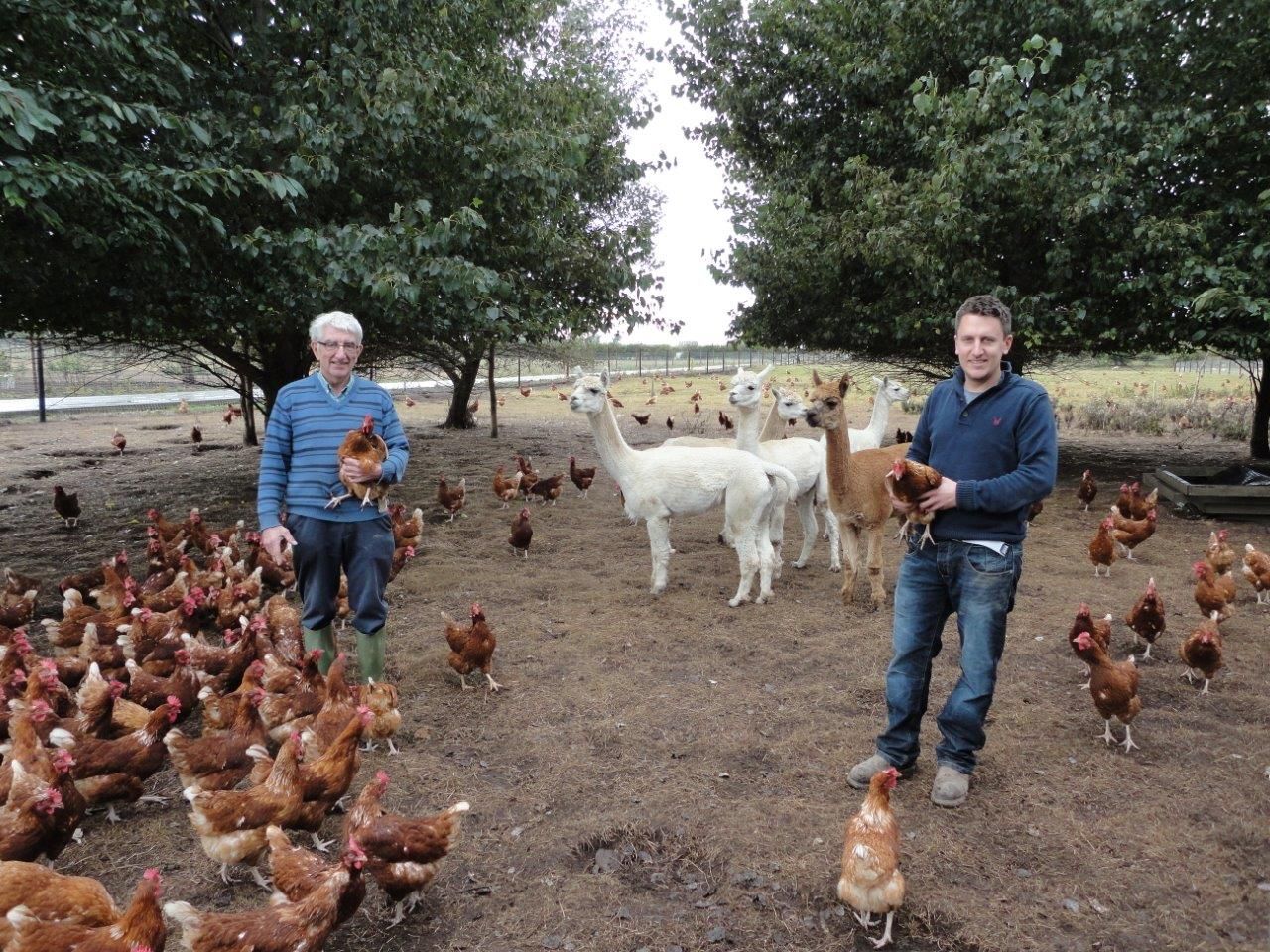Farming neighbours find themselves on opposite sides of Government's new free range divide

Farming neighbours Dave White and Daniel Brown will soon find themselves on opposite sides of a new free range divide following the Government's decision to partially lift the nationwide avian influenza housing order.
Their free range egg units are just 700 metres apart, yet come March 1 Dave White's birds will, according to the Government's chief vet, have to remain housed and will, consequently, become barn eggs.
On the other side of the fence, his neighbour Daniel Brown will be able to let his chickens roam free again.
They will retain their free range status and potentially earn Daniel 20 pence a dozen more for their eggs than the hens belonging to Daniel's less fortunate neighbour.
Both men agree that their contrasting fortunes appear to be the result of a cruel postcode lottery.
'Completely wrong'
“It's just looks like somebody in an office in London has sat down in front of a map and stabbed a pen at it," said Daniel, who says the approach taken by the Department for Environment, Food and rural Affairs (Defra) is completely wrong.
“The whole thing is a ridiculous idea. A wild swan will go where it wants. Why do they think it is more likely to land on my neighbour's field than mine."
Defra imposed a nationwide housing order in early December in an attempt to prevent wild birds spreading highly pathogenic H5N8 from continental Europe into commercial poultry in the United Kingdom.
When cases started to appear in the UK - there have been at least seven outbreaks - the order was extended until the end of February.
However, under European Union rules, free range birds can only be housed for 12 weeks before they lose their free range status.
The 12 weeks are up in the UK at the end of February. Defra has announced that the nationwide housing order will be lifted at that time, although with strict restrictions.
And it has ruled that poultry in what it sees as higher risk areas will have to remain locked up come March 1 - resulting in those birds being downgraded from free range to barn.

Dave White is within one of these higher risk zones - just.
'Heavy losses'
“The boundary of the zone runs along the back of Daniel's range," said Dave, whose farm is in Mildenhall, Suffolk.
Dave's farm - Willow Tree Farm - is just 15 acres and contains a 6,000-bird traditional flat deck unit, but he says that Defra's decision could leave him facing heavy losses.
“It looks like I may lose 20 pence a dozen if my eggs are downgraded to barn. My neighbour over the boundary will be able to let his birds out and his eggs will continue to be sold as free range. They should have decided that all birds are in or all birds are out - not done this."
Daniel, who has 44,000 free range birds, agrees with his neighbour, even though he appears to have drawn the winning ticket in Defra's housing order lottery.
“What they have decided is ridiculous. We should be treated the same. I just hope that someone is speaking to Defra and it will be changed."
Implications on prices
Robert Gooch, chief executive of the British Free Range Egg Producers' Association (BFREPA), said he did not know how many producers would continue to be subject to a housing order after February 28, but he said the association would be lobbying Government on behalf of those producers.
“We will be working hard on their behalf," said Robert, who said there were potentially serious implications for prices.
“There are those producers in the high risk area who will be forced to continue to house birds. They face the prospect of their eggs being downgraded, which we estimate to cost businesses at least 20p per dozen.
“At this stage we are unsure of the exact number of producers that are going to have to continue to house their flocks, but BFREPA is already working with the government, packers, retailers and industry to find solutions for these producers and will continue to do so.”
'Considerable effect on the supply chain'
NFU president Meurig Raymond said: “Free range poultry producers now face significant threats to their business after Defra's introduction of higher risk areas.
“The affected producers will now lose free range status from March 1 and this will have a considerable effect on the supply chain.
“Half of the UK’s national flock is free range, by far the highest percentage of any EU member state, and this will have a serious effect on the British public where demand for free range has increased significantly over the past 25 years."
“The NFU has concerns over the complexity that this system brings to the supply chain, but the lifting of the housing order will be welcome news to producers outside higher risk areas. Producers should assess the risk of AI on their farms appropriately before allowing their birds into the range area.
Daniel Brown said he felt that the chief vet should be able to decide that birds can continue to be housed in the current circumstances without the chickens losing their free range status.
However, the current rules are controlled by the EU and the Commission has so far refused to budge.
Producers in the Netherlands, Germany and France have already passed the 12-week deadline without any concessions.
Restrictions
In the UK, Defra has decided that after February 28 producers who are not within its designated higher risk areas will be able to let their birds out, although other restrictions will need to be put in place.
One option is for birds to be kept in aviaries, cages, netted pens or runs. Alternatively a producer can ensure that outside areas or ranges are totally covered with netting.
Another option is one that is described as "supervised access to enclosed outdoor areas."
In its guidance, Defra says that birds could have "supervised access to enclosed (fenced) outside areas provided you have taken proactive steps to make these areas unattractive to wild birds and taken action to reduce any existing contamination."
The guidance notes say, "Where it is allowed, this will be applicable to all bird keepers, whether they have a few chickens and ducks, or are a commercial poultry keeper."
When the decision was announced, chief veterinary officer Nigel Gibbens said: "Effective disease control will always be our priority. Based on the current situation, we believe mandatory bio-security across England, combined with targeted housing or range netting in higher risk areas, is the best option to control disease, protect birds’ welfare and ensure consumers can buy free range products.








